Theater Review Diary: The Oregon Shakespeare Festival — A Worthy Theatrical Adventure
The Oregon Shakespeare Festival is an annual theatrical adventure for many on the West coast, and should become one for the rest of the country – but make reservations early.
by Joann Green Breuer
With a budget approaching thirty-three million dollars, an eight month season, an audience approaching four hundred thousand, three stages, an outdoor playing area, a workshop space, over one hundred actors, a staff of five hundred, seventeen thousand household members/contributors, eleven shows in eclectic repertory, including an original cycle of commissioned works, American Revolutions: The United States History Cycle, helmed by the estimable Alison Carey, and an extraordinary Artistic Director, Bill Rauch, the Oregon Shakespeare Festival is a worthy and unique American theatre destination. Major funders recognize the value of the OSF—it was recently the recipient of a generous three million dollar grant from The Paul G. Allen Family Foundation. The grant supports the renaming of the Elizabethan Stage/Allen Pavilion to the Allen Elizabethan Theatre.
I have seen many OSF productions in Ashland, OR since 2007, when Bill was named Artistic Director. Ashland is an annual theatrical adventure for many on the West coast, and should become one for the rest of the country—but make reservations early. (The season runs through November.) Shows and hotel rooms are scarce shortly after season announcements. Rightly so.
Here is a brief assessment of the shows I saw this season. My review of Bill Rauch’s King Lear is here.
My Fair Lady, book and lyrics: Alan Jay Lerner, music: Frederick Loewe. Director and music director: Amanda Dehnert. Through November 3rd.
This memorable melodic twisting of George Bernard Shaw’s 1912 Pygmalion, itself a rethinking of the Greek myth, has been exposed by the insightful director Amanda Dehnert as a contemporary feminist struggle, a deceivingly upbeat version of The Taming of the Shrew. Shaw, with his Fabian notions, may have thought he was guiding Ibsen’s Nora on her post door slam journey, but Shakespeare’s Katherine, Juliet, and others lie under cover. To wit: Dehnert adds a balcony scene, and resonances of As You Like It’s Arden of verses. Eliza, the flower seller girl without an ‘h’, is transformed by enunciation and social niceties into one to whom flowers are brought. Henry Higgins, the dictatorial disciplinarian of diction, successful generator of Eliza’s moving up the social strata, is ultimately entranced by her natural appeal, the thing he is sworn to undo. Petruchio, in deed.
Shaw refused to see the tale as a love story. American adapters have delighted in betraying him. Not so completely by Dehnert. I did see the original Broadway version. This is significantly different, opening ones mind even while seducing ones senses.
After an unfortunate cliché pre-show displaying actors warming up, the action takes over. Two concert pianos are center stage, an arc of tiered seats around them on which chorus sit and interact when called upon. There are some lovely set and costume surprises, nothing extraneous, all to the point.
Rachel Warren’s Eliza, unlike Julie Andrews’s is more tough than tender, less a victim of circumstance than a force of its own. Her choreography stomps about the deck with feminine ferocity. This is truly “hoofing it,” powerful and persistent. Not a touch of sentimentality, lots of humor, and flickers of danger.
Henry Higgins, (Jonathan Haugen), abandoning the restrained elegance of Rex Harrison, moves restlessly about his studio, as if searching for an elusive something that he is not fully conscious he is looking for. An equal to his mind, of course. Where Harrison delivered sprech-song, speaking against accompaniment, Haugen actually sings, but moves rhythmically through dance steps, as if walking. A valid reflection on Harrison’s now iconic performance.
Dehnert has no fear of farce, as Freddy’s (Ken Robinson) over the top and off the rails (audience bannister) daring-do on Eliza’s street and gutter hilariously display.The versatile Anthony Heald carries on and is carried off mercilessly as Alfred P. Doolittle, the other declared “eternal” bachelor of this bifurcated world. The parallels of undeserving poor and undeserving rich may be obvious, but they are entertaining.
Dehnert knows what she is about. If a staging choice begins as an annoyance (does Higgins have to wander so much?), it ends in meaning. When Higgins finally sits, we know that discovery of his need has stilled him.
So how does Dehnert solve the problems of the dilemma of social ostracism (Eliza is no longer welcome or even recognized in her natal neighborhood) and patronizing partnership? Dehnert avoids them, neatly. Eliza and Henry meet on neutral ground, between classes, between stage and audience, climbing up and climbing down, and make their exit together, into a different world. It is clever, and it permits a touch of ambiguity. Shaw might even accept it.
The Unfortunates by Jon Beavers, Casey Hurt, Ian Merrigan, and Ramiz Monsef, with additional material by Kristoffer Diaz. Directed by Shana Cooper. Through November 2nd.
Prisoners of the plague and war, an ex-boxer with enormous fists (Ian Merrigan) and his beleaguered, compatriots chant and struggle in silence and fantasy, fighting to bring life to their chained existence. Their dog tags hang like nooses; identity is merely a number. There is no cure for political cruelty, just as there is no cure for the pandemic of plague. But there is always pretense. Let’s pretend is the purview of theatre, and the painful plight of these unfortunates.
The play is loud when it is not silent. It is pressured and pushed, an imposition kept in check by the borders of the tongue of the thrust stage, transforming from prison bars to public barroom via rough-throated blues. In the prisoners’ hideous line-up of dreams, a beloved armless princess (Kjerstine Rose Anderson) is struck with endemic plague, a supposedly dead king reveals himself, and a physician can no more heal another than he can heal himself. The clowns of shanty town beg for reluctant laughs. The point? The dystopia of society is matched in or out of prison: the only hope is an ending not to suffering, but to life. “I want you, I need you” is one of the themes explored in the grotesque variety show created by these prisoners, isolated individuals doomed by common bonds. This brand of theatre fare is not easily to an audience looking for easily digestible escapism.
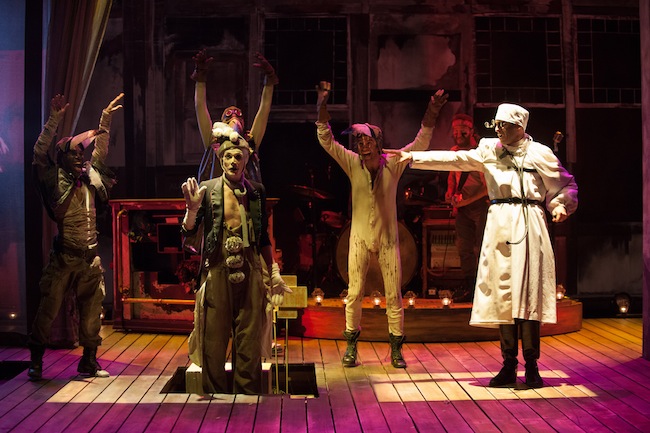
The OSF production of THE UNFORTUNATES. The Doctor (Ramiz Monsef) diagnoses Koko (Cristofer Jean) with the plague and he is sent to die, as the Rooks and band members (Ensemble) look on. Photo: Jenny Graham.
The fact that The Unfortunates has been selling out, folks even panting for unused tickets, says as much about the daring of the Oregon Shakespeare Festival as it does about its adventurous audience. This is not a pleasant hour and half experience. But it is not tedious. It is not preachy, though it loses some of its power by being so determinedly single minded. There are no signs of redemption on this stage. Death is the culmination of torture; all songs eventually become dirges. The cast drive the creative power of this dark vision, and one can presume that the making of art is compensation for the agony the evening portrays.
Cymbeline by William Shakespeare. Directed by Bill Rauch. Through October 11.
Okay, take everything I have to say about Bill Rauch with whatever dose of salt you choose. He was a student of mine, we remain close, and I am a fan.
A few years ago, Rauch directed Hamlet with Howie Seago, a deaf actor, as the ghost of Hamlet’s father. Seago signed, Hamlet repeated aloud what his father said to him, and signed and spoke in response. At his final moment, Hamlet says: “the rest is…” and he signs the word “silence,” his arms crossing in front of his chest and falling to his sides with his final breath. I get chills even as I remember it. Now Rauch has cast Howie Seago as the King in Cymbeline, the actor signing his role with self assured, if wrong headed, dignity. His relationships with his courtiers and family are defined by their fluency in the manual language. Not in my memory (this is my third viewing of Cymbeline) or research has the complicated, if occasionally absurd plot of this late soi disant romance been so clearly and meaningfully explicated.
Imogen, his betrayed daughter, is comfortable in her father’s native vernacular, Cloten mocks it, and others attempt it, with varied degrees of affect and effect. The King has his own personal interpreter because any king would have his own personal attendant. It all seems natural, and it is revelatory.
Once Cymbeline was one of the most popular of Shakespeare’s plays because it fed popular taste for sweet revenge. Consider its fairy tale elements: wicked Queen, naïve husband, rural Samaritans, and lies of purloined virtue. Today, the twists of tone amid the multitudes of denouements can feel risible. So be it. Rauch has exploited the comic potential of this script well, so a few giggles near the final (metaphorical) curtain are not unwarranted.

The OSF production of CYMBELINE. King Cymbeline (Howie Seago), influenced by his new wife, assures Imogen (Dawn-Lyen Gardner) that she will not marry Posthumus and instead marry the Queen’s son. Photo: Jenny Graham.
Cymbeline is staged in the outdoor, weather-buffeted Elizabethan Stage, the Allen Pavilion, a large reflection of the Globe performance space. Michael Ganio has created a wooden set, a complex environment that works for all the shows in the Pavilion. It serves adequately for Cymbeline, held in good focus by lighting designer David Weiner. Costume designer David C. Woolard aids in keeping the multitude of characters and loyalties straight, with good use of slashes of color in the autumnal surround.
Intimacy is not assumed. It must be devised. Spectacle is tempting, expected, and to be accomplished. Somehow, Rauch manages both, with a whisper when conspiracy beckons, a projection when the kingdom implodes. A bevy of performers conquer the timing of long entrances and the exigencies of temperature. The cast exudes energetic nuance.
Robin Goodrin Nordli as the Queen is deliciously evil. Dawn-Lyen Gardner offers a sympathetic Imogen, with enough gumption to make her survival in the woods of Wales convincing.
The Italian Iachimo, as interpreted by Kenajuan Bentley, is as oily as an overdressed marinara. Rauch’s firm directorial hand and sensible judgement are evident throughout. Imagery is never gratuitous. If someone spends his immoral life admiring his face in a hand held mirror, then how well justified is the retributive hand which will later cut off the lout’s mortal head.
My Fair Lady echoes this season’s The Taming of the Shrew, which I missed. Cymbeline has obvious echoes of King Lear, about which I say a word or two of ecstasy here. Fathers alienated from daughters by ego and presumption, a disconnection that leads to exile and transformation—at OSF both daughters in drag—and a final realization, one too late, one a bit too fanciful, if not farcical.
Yet what remains is the conceptual insight of Rauch’s putting the eponymous role of Cymbeline, holder of the kingdom, in Seago’s interpretive hands, pun intended. Communication is the heart of the matter, hands down.
The Liquid Plain by Naomi Wallace. Directed by Kwame Kwei-Armah. Through November 3rd.
Commissioned by the OSF American Revolutions project, The Liquid Plain begins in 1791 on a dock in Bristol, Rhode Island. Two former Black slaves pull a white man from the water. He revives, but with no memory and a painful guinea worm eating into his leg. Whatever has infected him will torture the newly named Thomas for the rest of his life. Whatever has bound Adjua and Dembi together will keep them enslaved to each other and their history for the rest of their lives. There is a mystery here, which I will not reveal. The life which Thomas has forgotten will continue to infest him like the worm. His behavior remains one of tormenting habit. The life of freedom which Adjua and Dembi await will not arrive. They will squat diurnally on the dock, the hoped for ship sunk, all land beyond the sea a perpetually fading, fruitless dream.
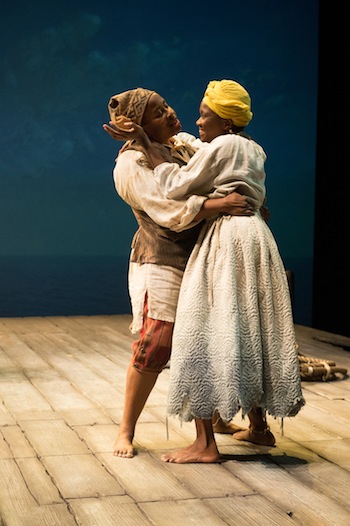
The OSF’s production of THE LIQUID PLAIN. Dembi (Kimberly Scott) and Adjua (June Carryl) delight in each other and their anticipated future. Photo by Jenny Graham.
Naomi Wallace, the playwright of One Flea Spare and other forays into rugged territory (The War Boys, Slaughter) was born in Kentucky—see her play The Trestle at Pope Lick Creek. In The Liquid Plain, as in much of her other work, Wallace is able to enter into an “alien” world/society without making any assumptions. She lets the chits fall where they are owed. Conventional wisdom has no place in her world. Characters are buffeted by birth and bias, but they are never defaced to universality, never defined down to moral simplicity. Humanity in Wallace’s vision is individuated, judged in the moment, not for all time, always with a question worth asking precisely because it is unanswerable.
Balthazar, he who brings news of the doomed rescue, has but one eye, He sees only disaster. There is also more.
Adjua and Dembi are a noisy duo, stomping on the planks, human cargo whose frustration and fervor keep them alive, at least for a while. Thomas fuels the tension, scraps of song cracking his amnesia, his manhood straining for relief.
The second act leaps time and place. The mundane shifts to musing. The little leather booklet in Thomas’s pocket becomes the catalyst for poetic lessons. Its author, William Blake, summoned by song and trance, appears, an unworldly respite from the drudgery of the downtrodden, a fertile spirit in ruined flesh. “I am a poet,” he says with a smile, “repetition dogs me.” We are to see the contents of Thomas’s pocket with another eye. This is a startling, unexpected scene. A new generation has crossed the sea to a land where words matter more than matter does. It is out of character, out of line, and out of the ordinary. It is precisely a scene such as this which gives imaginative dimension to what might otherwise be an academic work. Wallace once again defies both boundaries and predictions.
There is horror in The Liquid Plain. Adjua can “hear her bones shake,” and so do we. Thomas may have “no use for memory,” but Americans must. The past is not only not past, but it is not always what we are told it was.
June Carryl (Adjua), Kimberley Scott (Dembi), Danforth Comins (Cranston) and others all hold their roles close to the vest. They reveal what they must. One senses always an undercurrent of something too painful or too private to expose. Thomas’s memory loss is emblematic. The staging is straightforward. For the most part with minimal interference or inference.
I would wish for my unconditional praise for this recent work of an exceptional playwright. But. Honest critical appraisal prevents me. The final line is “I did not drown.” Yet someone (director? writer?) has drowned the speaker in an uncalled for penultimate gesture. In the crowd pleaser film Titanic, that familial ring is tossed to the fishes. I thought that impulse was ridiculous, a sop to some kind of middle brow semblance of tragedy. Here, how dare anyone throw Blake’s book of verses to the waves? Does one throw one’s life, one’s past, away? One’s inspiration? It is a rare moment of distrust in The Liquid Plain, melodrama at its most mediocre, entirely unworthy of this masterful writer’s exploration of the underside of human misuse of human beings.
The Tenth Muse by Tanya Saracho. Directed by Laurie Woolery. Through November 2nd.
Once again, OSF’s themes weave about each other. The plague is endemic: 1715, New Spain, (Mexico) a nunnery, and three stereotypical women are housed in a storage room, which, by chance (!), contains everything they will need to create a play and chart their future lives. There is the wealthy white woman, with the deus ex machina emerald earrings, pregnant and unmarried, of course; the wise Indian who is not surprisingly illegally literate; the bastard mestizo teen, caught between secular and sacred worlds, dark and light skin, and childhood and adulthood. Yes, cliché, and let’s not ignore the strict mother superior, the harsh sister with the heart of semi precious metal; the chubby, jealous kitchen stewardess with a cleaver, who (no revelation here), will become the villain of the priory; the near blind nun whose visions cannot be repressed.
No question the history of Mexican castes is worth noting. Unfortunately, the complex ethical issues of this era are delineated simplistically, which belies the value of historical investigation. Also, unfortunately, director Woolery underlines conventional characterizations rather than undermining them. No expectations unrealized, either via plot or pedagogical purpose. No question, this traditionally “well-made” play has teen appeal. It is predictable, morally comfortable, all the roles are for women and the good gals spring into action. Am I jaded? Sure. I admit it, unashamedly.
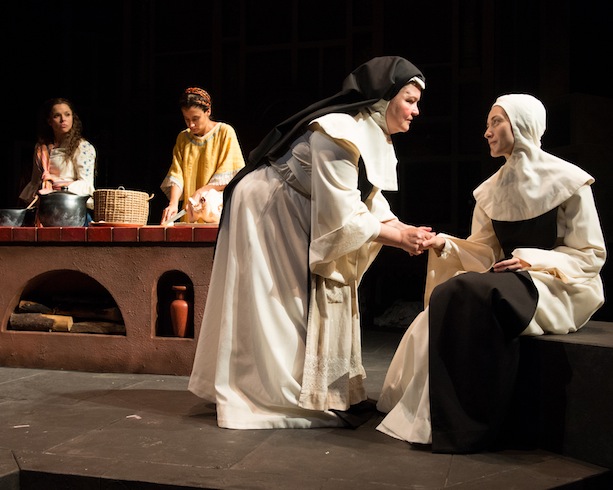
The OSF production of THE TENTH MUSE. Sor Filomena (K.T. Vogt) shares her concern about Sor Isabel’s (Sofia Jean Gomez) health, as the new girls (Vivia Font, Sabina Zuniga Varela) listen. Photo by Jenny Graham.
There is, however, a play waiting to be produced within this one. The sole imagistic flurry of this production is when the three lay women force open a large, very large, upstage center cabinet. (How the nuns let that stand closed for twenty years is one of many of the script’s incredulities.) Yellowed pages float down from the flies and many more pages are blown from the dusty shelves within that cabinet. On those pages is where the real play may lie written.
It turns out that the dead and forgotten nun, Sor Juana Ines de la Cruz, wrote plays, a decidedly unholy occupation for the play’s generation of the cloistered. In fact, Sor Juana was a real person, and really did compose plays, which were performed. One or more of those deserves translation and revival. Would that Saracho had taken on that worthy burden. Instead, she has the three lay women turning a section of the scene into a farce, costumes and props conveniently found in assorted boxes in the storage room—which by the way, is enormous, taking up almost the entire stage, more a storage basilica than basement. Would Saracho be a valid translator? I think it is worth her try. Despite the banal structure of The Tenth Muse, there are flashes of clever phrasings, fluency in English and Spanish, and clear effort at cultural respect, even if carried to a fault.
Joann Green Breuer is artistic associate of the Vineyard Playhouse.

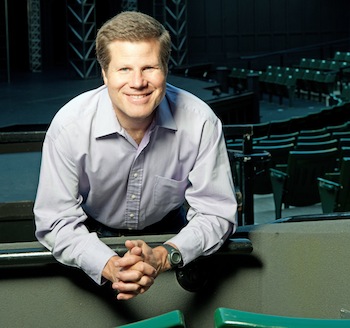
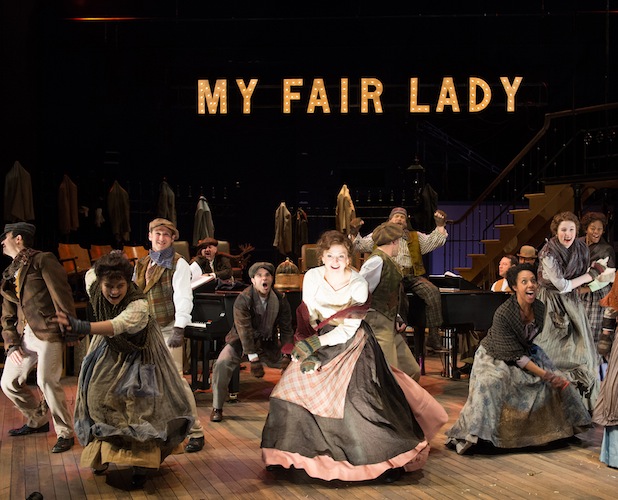
“Something that he is not fully conscious he is looking for” is a nice turn. And as a writer whose day job is teaching, I’m always interested in the (quite true) idea in the play that one’s language is a marker for class. In that, there’s hope.